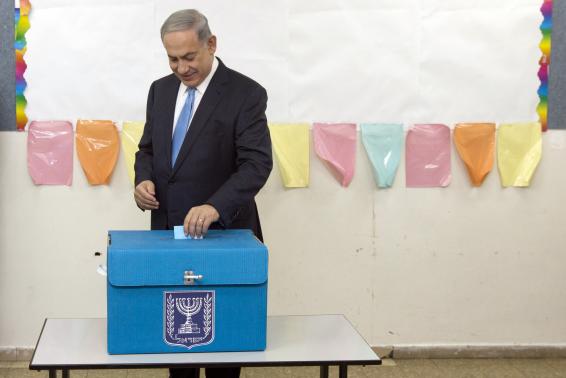 Israel's Prime Minister Benjamin Netanyahu casts his ballot for the parliamentary election at a polling station in Jerusalem March 17, 2015.[/caption]
Israel's Prime Minister Benjamin Netanyahu casts his ballot for the parliamentary election at a polling station in Jerusalem March 17, 2015.[/caption]Israel�s election has done a lot to reveal the challenges facing the country and the intentions of the men who seek to lead it. Prime Minister Benjamin Netanyahu�s outright�rejection of a Palestinian state�and his racist rant against Israeli Arab voters�on Tuesday showed that he has forfeited any claim to representing all Israelis.
Mr. Netanyahu, with two years to go in his current term, called the election in December for reasons that are still unclear. He expected to win an easy victory and then ended up fighting for his political life in a bitter battle with Isaac Herzog, the leader of the new center-left Zionist Union alliance and son of a former Israeli president.�With 99.5 percent of the ballots counted, the YNet news site reported Wednesday morning that Mr. Netanyahu�s Likud Party had possibly won 30 sats in the Knesset and Mr. Herzog�s Zionist Union had got 24 seats.
While Mr. Netanyahu ended up with more seats, it is Israel�s president, Reuven Rivlin, who will decide which leader gets to cobble together the next coalition government, the norm in a multiparty state where�no one party has ever won an outright majority in the 120-member Knesset. The process could take six weeks, and religious parties are likely to hold the key to victory, an asset for Mr. Netanyahu.
Mr. Netanyahu showed that he was desperate, and craven, enough to pull out all the stops. On Monday, he promised that if his Likud faction remained in power, he would never allow the creation of a Palestinian state, thus repudiating a position he had taken in 2009.
His behavior in the past six years � aggressively building Israeli homes on land that likely would be within the bounds of a Palestinian state and never engaging seriously in negotiations � has long convinced many people that he has no interest in a peace agreement. But his statement this week laid bare his duplicity, confirmed Palestinian suspicions and will make it even harder for him to repair his poisoned relations with President Obama, who has invested heavily in pushing a two-state solution.
Mr. Netanyahu added to the ugliness of the campaign when, during Tuesday�s voting, he said in a video on social media: �Right-wing rule is in danger. Arab voters are streaming in huge quantities to the polling stations.� This outrageous appeal to hard-line voters implied that only he could save Israel from its enemies, including the country�s Arab citizens, who represent 20 percent of the population and have long been discriminated against. There were signs that Arab Israelis were turning out in somewhat higher numbers, apparently to vote for the Joint Arab List, a coalition of four small parties.
Mr. Netanyahu�s demagogy further incites the rage that has torn the country apart. There were other inflammatory moments in recent days. Mr. Netanyahu claimed that nefarious foreign sources were trying to overthrow him and also promised to build more settlements, which most of the world consider to be illegal. Earlier this month, he made a subversive�speech before Congress�to castigate the Obama administration for seeking a nuclear deal with Iran, but that seems to have done little to enhance his support in Israel.
In his desperation, Mr. Netanyahu resorted to fear-mongering and anti-Arab attacks while failing to address the issues that Israelis said they were most worried about, namely the high cost of housing and everyday living in Israel. Although the economy has grown, the country has experienced widening income disparities and is now one of the most�unequal societies in the advanced world.
Mr. Herzog made such domestic concerns a centerpiece of his campaign. While peace talks with the Palestinians were not a major focus of the Zionist Union campaign, or the election generally, he made clear that if elected he would try to restart negotiations.
Late Tuesday, Mr. Rivlin said he would work for a national unity government with Likud and the Zionist Union. It is difficult to see how Mr. Netanyahu could find enough common ground with any moderate faction to govern constructively.
By The New York Times










